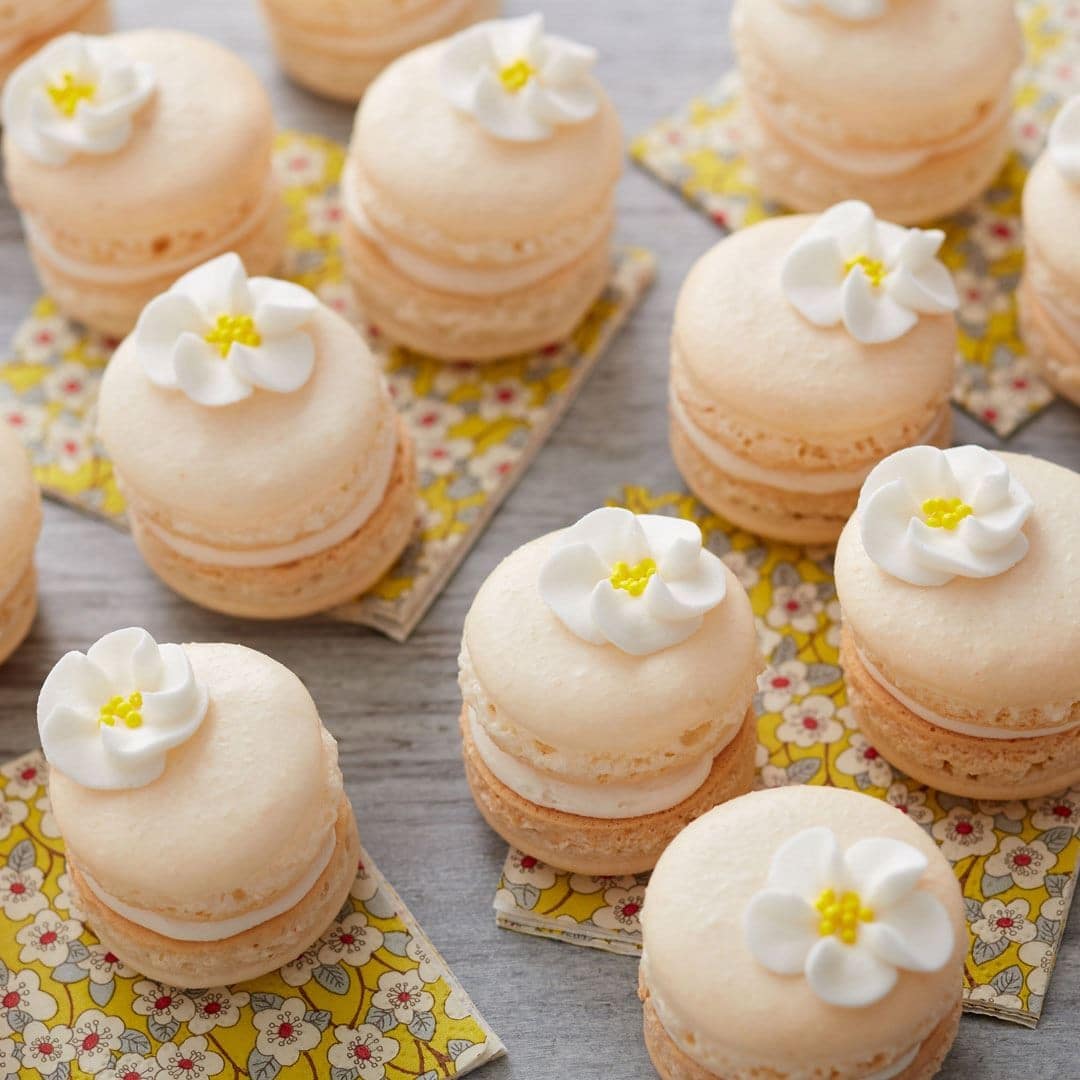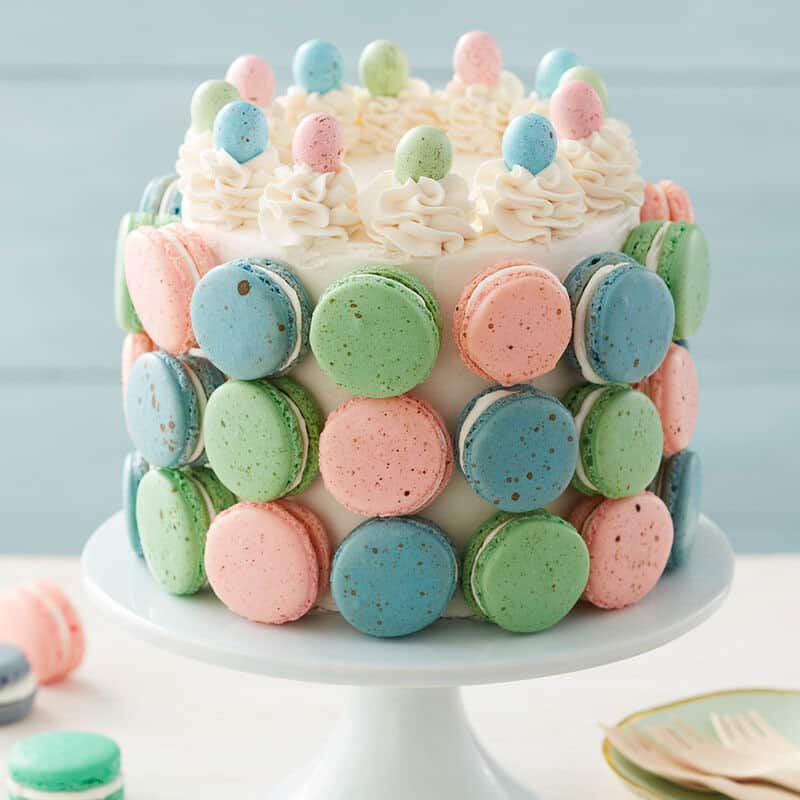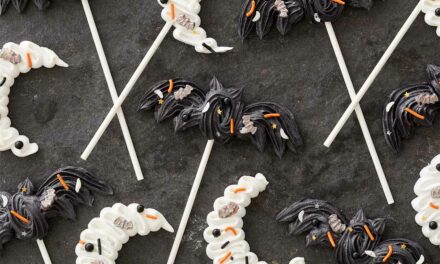Seemingly both crispy and soft at the same time, these homemade macarons have a nougat-like texture and can be filled with anything from buttercream to lemon curd. They’re definitely delicious and with our easy step-by-step guide, they’re easy to make too!
Before you get started, be sure to check out our Macaron Troubleshooting: Your Questions Answered blog post for some helpful tips on which ingredients to use, what soft and stiff peaks look like, how to prevent hollow shells and how to get those fancy feet on your cookies!
For the creative at heart, there are lots of fun ways to customize your macarons! Check out our post on Easy French Macaron Decorating Ideas for some great ideas on how to use color, flavor and piping techniques to add your own twist to these tasty treats!
When you feel like you’re ready, here’s our easy-to-follow French macaron recipe that will have your friends and family saying “Oh là là!”

French Macaron Recipe
Equipment
- Fine Mesh Sieve
- Electric Hand Mixer or Stand Mixer
- Large Round Piping Tip
Ingredients
- 2 cups Powdered Sugar Confectioners' Sugar
- 1 cup Almond Flour Finely Ground Almonds
- 3 Egg Whites Room Temperature, Separated at Least a Day in Advance
- ¼ teaspoon Cream of Tartar
- Pinch of Salt
- ¼ cup Granulated Sugar
- 1 teaspoon Vanilla Extract
- Food Coloring
- Filling of Your Choice
Instructions
- Preheat oven to 275°F. Prepare 2 baking sheets with parchment paper. Fit a 16 inch decorating bag with decorating tip 10.
- Sift powdered sugar and almond flour together, discarding any bits of almond flour that are too large to pass through the strainer.

- In a large bowl, beat egg whites, cream of tartar and salt on high speed until foamy. With the mixer running, gradually add in small amounts of granulated sugar at a time. Make sure your egg whites have been separated a day in advance to help avoid over-whipping. When the mixture reaches soft peaks, add vanilla and gel food coloring.

- Continue whipping just until the mixture forms stiff peaks. You’ve reached stiff peaks if you pull your beaters out of the bowl and the peaks remain upright.

- Gently and gradually pour the almond mixture over the whipped egg whites so they don’t deflate. Using a rubber spatula, fold the dry ingredients into wet ingredients in batches to avoid deflating the egg whites. Gently fold the almond flour mixture into the egg whites until the mixture holds a 10 count.How to measure a 10 count: When the batter falls from the spatula to the bowl it should take about 10 seconds until it fully blends back into the rest of the batter. This method helps ensure that the almond mixture is fully hydrated, while allowing egg whites to still retain some air.The mixture should be thick enough to pipe without running everywhere, but thin enough for the peak of each piped cookie to fall on its own. The batter should appear to have a honey-like consistency. This takes about 45 turns, but depending on how aggressively you fold, it can be more or less.

- Transfer the macaron batter to the prepared decorating bag.
- Pipe 1 inch rounds of batter onto the parchment lined pans, spacing at least 1 inch apart. Use the macaron template under the parchment paper to help you create perfectly round macarons.If your macarons spread quickly once piped, your batter is likely too thin, caused by overmixing or under-whipped egg whites.

- Tap the baking sheet hard on the countertop 4-5 times to release air bubbles, avoiding cracked tops. Let the unbaked macarons sit at room temperature for 20 to 30 minutes or until the unbaked macarons form a skin. The skin should not stick to your finger when carefully touched. The skin creates the signature 'feet', which are the rings that arise at the base of each cookie during baking.
- Bake for 18 to 22 minutes on a shelf in the center of the oven. If baking 2 pans at a time on different oven racks, rotate the pans from bottom to top midway through baking.There isn’t a great visual on how long to bake macarons. When underbaked, the centers can be wet. When overbaked, they start to brown slightly and become very crunchy instead of crisp on the top with a softer interior.
- Place the macaron shells on a cooling grid to cool completely before sandwiching with your filling.
- Place a dollop of your filling on one macaron shell and top with another shell. Flavored buttercreams, jams, and chocolate ganache are all great options for macaron fillings.

- Troubleshoot any macaron problems or concerns you come across with our Macaron Troubleshooting Guide.
Video
Notes
- Wait one day before eating. Let cookies sit in an airtight container for 24 hours to allow the flavors to bloom. This also allows the cookie to absorb some moisture from the filling, which helps it stay intact when bitten into.
- Use room temperature ingredients. Make sure to use room temperature egg whites in your batter. Store-bought liquid egg whites or meringue powder will not create a meringue batter that is strong enough for macarons.
- Use aged egg whites. “Aged” egg whites are necessary to help prevent over-whipping and create stiff peaks. Make sure to separate your egg whites a day prior, refrigerated in an air-tight container. Bring your egg whites back to room temperature when ready to use. Having the egg whites at room temperature helps them whip up better. Never use cartoned egg whites or meringue powder for making macarons.
- Test for proper batter consistency. Use the figure 8 method. Lift a small amount of batter with a spatula and drop it back into the bowl in a figure 8 motion. The batter is ready to pipe when the 8 is absorbed back into the batter within 10 seconds.
- Trace outlines on parchment paper. Trace circles on the back of your parchment paper in pencil using the macaron template. You can also use a 1-inch cookie cutter or another round object to trace circles.
- Use grease-free utensils and bowls.
- Use gel food or ultra-concentrated coloring. Liquid food coloring can negatively affect macaron batter.
- Hollow shells: Hollow shells occur when egg whites are over-whipped or under-whipped. To prevent this, make sure your egg whites reach stiff peaks.
- Cracked tops: Cracked tops typically occur when there's too much air in the batter. After piping macarons, make sure to rap the baking tray against your counter to remove any air bubbles.
- No feet: The most common reason feet don't develop is because macarons didn't develop a skin before going into the oven. Always allow piped macaron batter to sit at room temperature for 20-30 minutes to develop skin. Another reason may be that the batter is too wet, which may be caused by coloring or flavoring.


What macaron tips can you share? Let us know in the comments below or take a picture of your cookies and tag us on Instagram @Wiltoncakes. Bon appétit!










Hi, may I know if the confectioners sugar amount is part of the chemistry for the macarons shell to rise? Will it be possible if I use 1cup of confectioners sugar instead of 2?
Hi Shirley – We do not recommend reducing the sugar when making a full batch of Macarons.
My shells keep coming out hollow. I’ve tried adjusting the oven temp , baking longer… help!
Usually macaroons are hollow from over beating the meringue. You want stiff peaks before folding in the dry ingredients and stop once you get to stiff peaks.
Also make sure you tap you macaroons after piping to get better results. Good luck!
Here is a blog post on macaron troubleshooting that may also be helpful.
https://blog.wilton.com/macaron-troubleshooting-your-questions-answered/
actually – aged egg whites work better than ‘fresh ones’ – I age mine for at least 1 – 2 weeks prior to using them in macarons.
OMG! You always share amazing posts I have great confidence on your all recipes. I am going to add these Macarons to my holiday baking list.
Would this work with a container of egg whites rather than fresh from eggs?
When making my macrons they won’t raise and the feet go out and not up. I am not sure what I am doing wrong. could I be over mixing or are my eggs not in a stiff enough peak. Any suggestions would be great. Thanks.
Check your oven temp first? It sounds like it’s running too low.